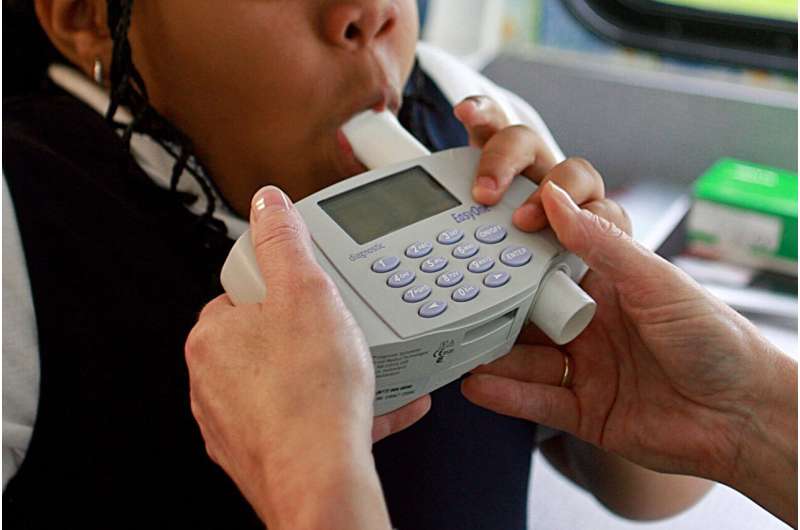This article has been reviewed according to Science X's editorial process and policies. Editors have highlighted the following attributes while ensuring the content's credibility:
fact-checked
peer-reviewed publication
reputable news agency
proofread
Black men were likely underdiagnosed with lung problems because of bias in software, study suggests

Racial bias built into a common medical test for lung function is likely leading to fewer Black patients getting care for breathing problems, a study published Thursday suggests.
As many as 40% more Black male patients in the study might have been diagnosed with breathing problems if current diagnosis-assisting computer software was changed, the study said.
Doctors have long discussed the potential problems caused by race-based assumptions that are built into diagnostic software. This study, published in JAMA Network Open, offers one of the first real-world examples of how the the issue may affect diagnosis and care for lung patients, said Dr. Darshali Vyas, a pulmonary care doctor at Massachusetts General Hospital.
The results are "exciting" to see published but it's also "what we'd expect" from setting aside race-based calculations, said Vyas, who was an author of an influential 2020 New England Journal of Medicine article that catalogued examples of how race-based assumptions are used in making doctors' decisions about patient care.
For centuries, some doctors and others have held beliefs that there are natural racial differences in health, including one that Black people's lungs were innately worse than those of white people. That assumption ended up in modern guidelines and algorithms for assessing risk and deciding on further care. Test results were adjusted to account for—or "correct" for—a patient's race or ethnicity.
One example beyond lung function is a heart failure risk-scoring system that categorizes Black patients as being at lower risk and less likely to need referral for special cardiac care. Another is an equation used in determining kidney function that creates estimates of higher kidney function in Black patients.
The new study focused on a test to determine how much and how quickly a person can inhale and exhale. It's often done using a spirometer—a device with a mouthpiece connected to a small machine.
After the test, doctors get a report that has been run through computer software and scores the patient's ability breathe. It helps indicate whether a patient has restrictions and needs further testing or care for things like asthma, chronic obstructive pulmonary disorder or lung scarring due to air pollutant exposure.
Algorithms that adjust for race raise the threshold for diagnosing a problem in Black patients and may make them less likely to get started on certain medications or to be referred for medical procedures or even lung transplants, Vyas said.
While physicians also look at symptoms, lab work, X-rays and family histories of breathing problems, the pulmonary function testing can be an important part of diagnoses, "especially when patients are borderline," said Dr. Albert Rizzo, the chief medical officer at the American Lung Association.
The new study looked at more than 2,700 Black men and 5,700 white men tested by University of Pennsylvania Health System doctors between 2010 and 2020. The researchers looked at spirometry and lung volume measurements and assessed how many were deemed to have breathing impairments under the race-based algorithm as compared to under a new algorithm.
Researchers concluded there would be nearly 400 additional cases of lung obstruction or impairment in Black men with the new algorithm.
Earlier this year, the American Thoracic Society, which represents lung-care doctors, issued a statement recommending replacement of race-focused adjustments. But the organization also put a call out for more research, including into the best way to modify software and whether making a change might inadvertently lead to overdiagnosis of lung problems in some patients.
Vyas noted some other algorithms have already been changed to drop race-based assumptions, including one for pregnant women that predicts risks of vaginal delivery if the mom previously had a cesarean section.
Changing the lung-testing algorithm may take longer, Vyas said, especially if different hospitals use different versions of race-adjusting procedures and software.
More information: Alexander T. Moffett et al, Global, Race-Neutral Reference Equations and Pulmonary Function Test Interpretation, JAMA Network Open (2023). DOI: 10.1001/jamanetworkopen.2023.16174
Adam Gaffney, Pulmonary Function Prediction Equations—Clinical Ramifications of a Universal Standard, JAMA Network Open (2023). DOI: 10.1001/jamanetworkopen.2023.16129
Lundy Braun et al, Race, Lung Function, and the Historical Context of Prediction Equations, JAMA Network Open (2023). DOI: 10.1001/jamanetworkopen.2023.16128
© 2023 The Associated Press. All rights reserved. This material may not be published, broadcast, rewritten or redistributed without permission.




















